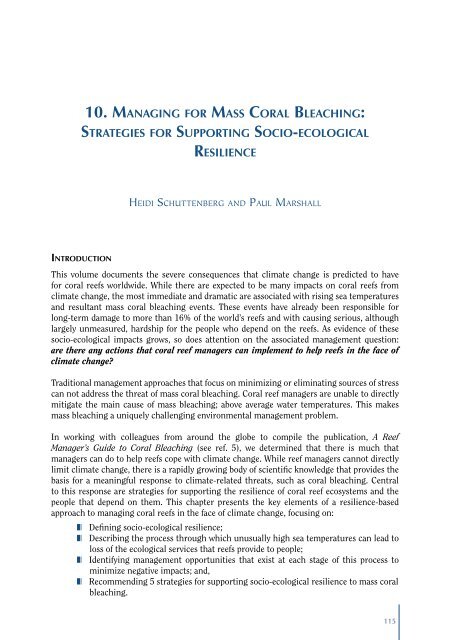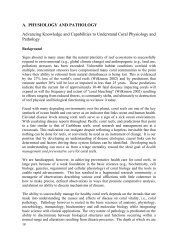Status of Caribbean coral reefs after bleaching and hurricanes in 2005
Status of Caribbean coral reefs after bleaching and hurricanes in 2005
Status of Caribbean coral reefs after bleaching and hurricanes in 2005
You also want an ePaper? Increase the reach of your titles
YUMPU automatically turns print PDFs into web optimized ePapers that Google loves.
10. Ma n ag i n g f o r Ma s s Co r a l Bl e a c h i n g:Strategies f o r Support<strong>in</strong>g So c i o-e c o l o g i c a lResilienceHe i d i Sc h u t t e n b e r g a n d Pau l Ma rs h a l lIn t r o d u c t i o nThis volume documents the severe consequences that climate change is predicted to havefor <strong>coral</strong> <strong>reefs</strong> worldwide. While there are expected to be many impacts on <strong>coral</strong> <strong>reefs</strong> fromclimate change, the most immediate <strong>and</strong> dramatic are associated with ris<strong>in</strong>g sea temperatures<strong>and</strong> resultant mass <strong>coral</strong> <strong>bleach<strong>in</strong>g</strong> events. These events have already been responsible forlong-term damage to more than 16% <strong>of</strong> the world’s <strong>reefs</strong> <strong>and</strong> with caus<strong>in</strong>g serious, althoughlargely unmeasured, hardship for the people who depend on the <strong>reefs</strong>. As evidence <strong>of</strong> thesesocio-ecological impacts grows, so does attention on the associated management question:are there any actions that <strong>coral</strong> reef managers can implement to help <strong>reefs</strong> <strong>in</strong> the face <strong>of</strong>climate change?Traditional management approaches that focus on m<strong>in</strong>imiz<strong>in</strong>g or elim<strong>in</strong>at<strong>in</strong>g sources <strong>of</strong> stresscan not address the threat <strong>of</strong> mass <strong>coral</strong> <strong>bleach<strong>in</strong>g</strong>. Coral reef managers are unable to directlymitigate the ma<strong>in</strong> cause <strong>of</strong> mass <strong>bleach<strong>in</strong>g</strong>; above average water temperatures. This makesmass <strong>bleach<strong>in</strong>g</strong> a uniquely challeng<strong>in</strong>g environmental management problem.In work<strong>in</strong>g with colleagues from around the globe to compile the publication, A ReefManager’s Guide to Coral Bleach<strong>in</strong>g (see ref. 5), we determ<strong>in</strong>ed that there is much thatmanagers can do to help <strong>reefs</strong> cope with climate change. While reef managers cannot directlylimit climate change, there is a rapidly grow<strong>in</strong>g body <strong>of</strong> scientific knowledge that provides thebasis for a mean<strong>in</strong>gful response to climate-related threats, such as <strong>coral</strong> <strong>bleach<strong>in</strong>g</strong>. Centralto this response are strategies for support<strong>in</strong>g the resilience <strong>of</strong> <strong>coral</strong> reef ecosystems <strong>and</strong> thepeople that depend on them. This chapter presents the key elements <strong>of</strong> a resilience-basedapproach to manag<strong>in</strong>g <strong>coral</strong> <strong>reefs</strong> <strong>in</strong> the face <strong>of</strong> climate change, focus<strong>in</strong>g on:zx Def<strong>in</strong><strong>in</strong>g socio-ecological resilience;zx Describ<strong>in</strong>g the process through which unusually high sea temperatures can lead toloss <strong>of</strong> the ecological services that <strong>reefs</strong> provide to people;zx Identify<strong>in</strong>g management opportunities that exist at each stage <strong>of</strong> this process tom<strong>in</strong>imize negative impacts; <strong>and</strong>,zx Recommend<strong>in</strong>g 5 strategies for support<strong>in</strong>g socio-ecological resilience to mass <strong>coral</strong><strong>bleach<strong>in</strong>g</strong>.115
















